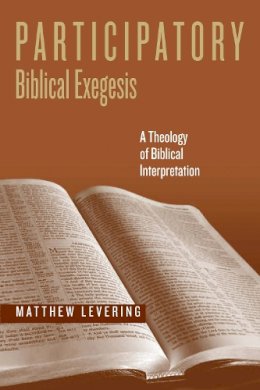10%OFF
Stock image for illustration purposes only - book cover, edition or condition may vary.
Participatory Biblical Exegesis: A Theology of Biblical Interpretation (ND Reading the Scriptures)
Matthew Levering
FREE Delivery in Ireland
Description for Participatory Biblical Exegesis: A Theology of Biblical Interpretation (ND Reading the Scriptures)
Paperback. The interpretation of Scripture has depended largely on the view of history held by theologians and exegetes. This title examines the changing views of history that distinguish patristic and medieval biblical exegesis from modern historical-critical exegesis. It provides an original theological basis for critical exegesis. Num Pages: 344 pages. BIC Classification: HRCG3; HRLB. Category: (P) Professional & Vocational; (UP) Postgraduate, Research & Scholarly; (UU) Undergraduate. Dimension: 231 x 155 x 24. Weight in Grams: 485.
The interpretation of Scripture has depended largely on the view of history held by theologians and exegetes. In Participatory Biblical Exegesis, Matthew Levering examines the changing views of history that distinguish patristic and medieval biblical exegesis from modern historical-critical exegesis.
Levering argues for a delicate interpretive balance, in which history is understood both as a process that participates in God’s creative and redemptive presence and as a set of linear moments. He identifies a split between theological and historical interpretations of scripture beginning in the high Middle Ages, considerably earlier than the emergence of historical-critical methods in the seventeenth ... Read moreand eighteenth centuries. Instead, he offers a vision of Scripture that is rooted in the exegetical practice of St. Thomas Aquinas and his sources but embraces historical-critical research as well.
Participatory Biblical Exegesis provides an original theological basis for critical exegesis. It integrates the work of contemporary exegetes, philosophers, theologians, and historians to provide a compelling vision of biblical interpretation.
Show Less
Product Details
Publisher
University of Notre Dame Press
Place of Publication
Notre Dame IN, United States
Shipping Time
Usually ships in 7 to 11 working days
About Matthew Levering
Matthew Levering is the Perry Family Foundation Professor of Theology at Mundelein Seminary. He has published numerous books, including Christ’s Fulfillment of Torah and Temple: Salvation according to Thomas Aquinas (University of Notre Dame Press, 2002).
Reviews for Participatory Biblical Exegesis: A Theology of Biblical Interpretation (ND Reading the Scriptures)
"Here one of the most prolific young Catholic theologians offers a stimulating diagnosis of what's missing from contemporary perspectives on biblical interpretation. Levering's focus on properly understanding the nature of 'history' can reorient not only Catholic interpreters but also other traditions, without denying the legitimate value of critical scholarship. His nuanced recovery of the church's classic wisdom abounds with theological ... Read morerichness and spiritual encouragement." —Daniel J. Treier, Wheaton College “Levering compellingly argues for the legitimacy of a type of biblical interpretation once prevalent among the Fathers of the Church and medieval theologians, one that includes a participatory encounter with the divine. . . . Written from a Roman Catholic perspective, the volume will appeal to anyone interested in biblical interpretation. While directed toward scholars, the
book is nonetheless accessible to the intelligent lay reader.” —Library Journal “Levering has written an engaging and fair-minded intellectual history which aims to return modern biblical interpretation to its philosophical and theological source in the practice of the Church Fathers and medieval interpreters. . . . Levering is to be credited, however, with advancing a Catholic approach to Scripture within the broadly ecumenical context of the ongoing public theology debate.” —Letter and Spirit “New methods in biblical interpretation have become something of a staple in the theological diet over the past decade, but the subject is so vast that a different angle is always possible, and Matthew Levering offers us just that. In this book, he explores the thesis that the interpretation of Scripture followed a particular path of development up to the late thirteenth century, when it suddenly diverged into something much more academic and distant from the life of the church.” —Themelios “[Levering] is keen to promote a reunion of premodern exegesis with historical criticism, and to do so without denying the important gains of historical criticism.” —The Catholic Biblical Quarterly “Interest in the patristic and medieval traditions of biblical interpretation has been growing in the last decade, in both Protestant and Catholic circles. Levering’s book is a sophisticated and detailed contribution to the approach.” —Theological Studies “Levering . . . contends that Christian biblical exegesis, in accord with the Christian and biblical understanding of reality, should envision history not only as a linear unfolding of individual moments but also as an ongoing participation in God’s active providence, both metaphysically and christologically-pneumatologically” —New Testament Abstracts “Participatory Biblical Exegesis stands out from the ever-growing mass of books on bibliography by offering a cogent pathology of contemporary biblical exegesis, which manages to free itself from the quagmire of hermeneutical theory. Yet it goes beyond the task of diagnosis and, by appealing to Aquinas, illustrates the way exegesis can be done, and indeed has been done, when unencumbered by the conventions of contemporary hermeneutics which have in large part been underwritten by a linear-historical view of reality.” —European Journal of Theology “In this lengthy monograph that consists of five solid chapters, Levering examines and integrates works of contemporary as well as ancient exegetes, philosophers, theologians, and historians in order to offer an original theological basis for critical and biblical interpretation. The basic argument of the book is that biblical exegesis must involve an understanding of historical reality, which is ongoing in the life of the Church and its people.” —Catholic Library World “At core, this is Levering’s notion of the participatory framework: we interpret out of the broader notion of God’s participation in human history, including God’s involvement in biblical revelation. . . . While this text is firmly written from the Roman Catholic perspective, its insights are well documented and have definite application to Protestant exegesis. It is well worth including in our broader dialogue of interpretation.” —Interpretation Show Less

